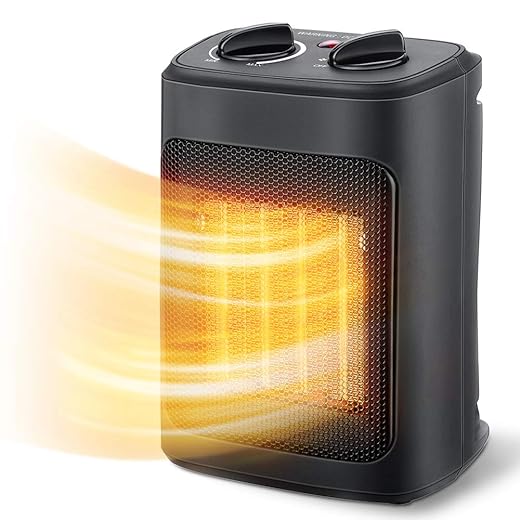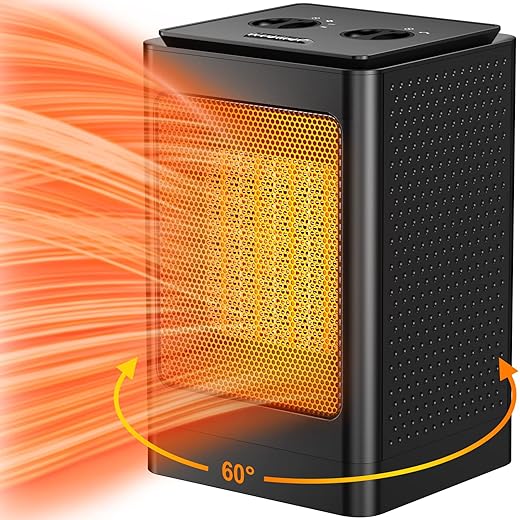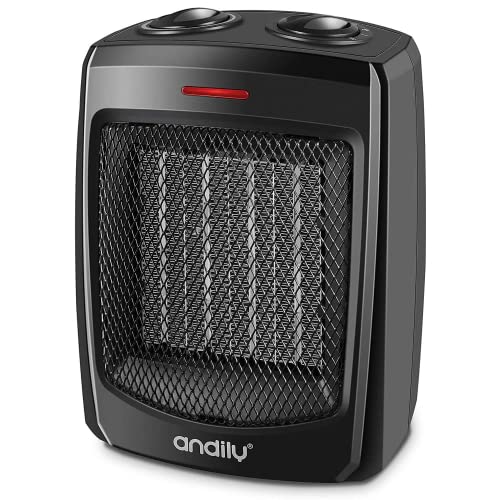Black Friday is a highly anticipated shopping event that takes place on the day after Thanksgiving in the United States. During Black Friday, retailers offer significant discounts and deals on a wide range of products, including heaters.
A heater is a device designed to generate and distribute heat in an enclosed space, providing warmth and comfort during colder months. Black Friday presents an excellent opportunity to find discounted prices on various types of heaters, such as space heaters, electric heaters, oil-filled radiators, infrared heaters, and more.
Whether you’re looking to warm up a specific room or supplement your existing heating system, Black Friday can be a great time to shop for a heater and take advantage of the discounts available, helping you stay cozy during the winter season.
Does buying a heater save money?
Buying a heater can potentially save you money in several ways:
- Efficient heating: Modern heaters, especially those with energy-efficient features like programmable timers and thermostat controls, allow you to heat specific areas or rooms in your home. By using a heater to target the spaces you’re occupying instead of heating the entire house, you can reduce energy consumption and save money on heating bills.
- Supplemental heating: If you have central heating in your home, using a heater as a supplemental source of heat can help reduce the load on your main heating system. Instead of cranking up the thermostat, you can use a heater to provide additional warmth in the rooms you spend the most time in, thereby potentially lowering overall heating costs.
- Zoned heating: A heater can provide zoned heating, allowing you to heat specific areas of your home as needed. This means you can keep unused rooms cooler while comfortably heating the spaces you’re actively using. Zoned heating can help save money by avoiding heating unoccupied areas.
- Energy-efficient models: When shopping for a heater, look for energy-efficient models that are designed to use less energy while providing effective heating. Heaters with energy-saving features, such as thermostats, timers, and adjustable settings, can help optimize energy usage and reduce costs over time.
- Seasonal or local climate variations: Depending on the region you live in, there may be periods where a heater is sufficient for maintaining a comfortable temperature. In milder climates, a heater can be a cost-effective alternative to running a central heating system year-round.
It’s important to note that the potential cost savings from using a heater will depend on various factors, such as the size of your home, insulation, local climate, and the specific heater you choose. Additionally, it’s essential to use your heater wisely and practice energy-conscious habits, such as turning it off when not needed, optimizing temperature settings, and properly insulating your home to minimize heat loss.
While buying a heater can contribute to cost savings, it’s crucial to weigh the upfront purchase cost against the potential long-term energy savings to determine the overall financial benefit.
What time of year is best to buy a heater?
The best time to buy a heater depends on various factors, including your specific needs, budget, and regional climate. However, there are a few general trends to consider:
- Off-season sales: In many regions, heaters tend to be in higher demand during the colder months, such as fall and winter. As a result, prices may be higher during these times due to increased demand. Consider shopping for heaters during the off-season, such as spring or summer, when demand is lower and retailers may offer discounts to clear out inventory.
- End-of-season sales: Towards the end of winter, retailers may offer clearance sales to make room for new inventory. This can be a good time to find discounted prices on heaters as they try to sell remaining stock. Keep an eye out for end-of-season sales or promotions.
- Holiday sales: Various holidays throughout the year, such as Black Friday, Cyber Monday, or Labor Day, often feature sales and discounts on a wide range of products, including heaters. These sales events can be an excellent opportunity to find deals on heaters and save money.
- New model releases: Heater manufacturers may introduce new models or updated versions of existing heaters at specific times of the year. When new models are released, older models may go on sale to make way for the newer inventory. Keep an eye on product announcements and releases to potentially find discounts on older models.
- Local climate: Consider your local climate and the timing of the colder months in your region. If the colder season is longer or more severe, there may be more demand for heaters, which could impact pricing and availability. It might be beneficial to plan ahead and purchase a heater before the peak demand hits.
Remember to compare prices, read reviews, and consider factors such as energy efficiency, heating capacity, and safety features when shopping for a heater. By being strategic with your timing and taking advantage of seasonal sales, you can find a heater that suits your needs while potentially saving money.
What is the best heater to save electricity?
When it comes to choosing a heater that saves electricity, there are a few key factors to consider:
- Energy-efficient models: Look for heaters with energy-saving features and certifications, such as ENERGY STAR. These models are designed to use less energy while providing effective heating. Energy-efficient heaters often have adjustable thermostat controls, programmable timers, and multiple heat settings, allowing you to optimize energy usage based on your needs.
- Electric heaters with thermostats: Heaters that include a built-in thermostat are beneficial for energy efficiency. The thermostat allows you to set and maintain a specific temperature, preventing the heater from running excessively and consuming unnecessary energy. Once the desired temperature is reached, the heater will cycle on and off as needed.
- Radiant heaters: Radiant heaters emit infrared radiation that directly heats objects and people in the room, rather than heating the air. This targeted heating method can be more efficient since it avoids heating unused areas or wasting energy on air circulation. Radiant heaters can provide quick and focused warmth, making them energy-efficient options.
- Oil-filled radiators: Oil-filled radiators are known for their energy efficiency. These heaters use electricity to heat the oil inside, which then radiates heat into the room. Oil-filled radiators have a high heat retention capacity, allowing them to continue emitting heat even after they are turned off. This helps to save energy and maintain a comfortable temperature.
- Proper sizing: Choose a heater that is appropriately sized for the space you intend to heat. An oversized heater may consume more energy than necessary, while an undersized heater may struggle to adequately heat the area. Check the manufacturer’s recommendations for room size and heating capacity to ensure you select the right-sized heater for your needs.
- Smart features: Some modern heaters come with smart features that allow you to control and monitor them remotely through smartphone apps. These features enable you to schedule heating times, adjust temperature settings, and monitor energy usage, helping you optimize energy efficiency and reduce wastage.
Remember, while these features and types of heaters are generally more energy-efficient, it’s essential to use your heater wisely by turning it off when not needed, adjusting temperature settings to appropriate levels, and ensuring proper insulation in your home to minimize heat loss.
It’s recommended to compare energy efficiency ratings, read customer reviews, and consider your specific heating requirements when choosing a heater to save electricity.
What is the cheapest energy efficient heater?
The cheapest energy-efficient heater options may vary based on your specific needs and preferences, but here are a few affordable options to consider:
- Ceramic space heaters: Ceramic space heaters are known for their energy efficiency and affordability. They use ceramic heating elements to provide quick and targeted heat. Look for models with adjustable thermostats and programmable timers to further optimize energy usage.
- Oil-filled radiators: Oil-filled radiators are another cost-effective option. They are known for their ability to retain heat and provide a steady, gentle warmth. These heaters use electricity to heat the oil inside, which then radiates heat into the room. They are often equipped with adjustable thermostats and multiple heat settings for energy efficiency.
- Micathermic heaters: Micathermic heaters are thin and lightweight heaters that use both convection and radiant heating technologies. They heat up quickly and distribute heat evenly. While they may be slightly more expensive than other options, they are generally energy efficient and cost-effective to operate.
- Infrared heaters: Infrared heaters work by emitting infrared radiation that heats objects and people directly, rather than heating the air. They are efficient in terms of energy usage and can provide instant warmth. Look for models with energy-saving features like adjustable heat levels and timers.
- Electric baseboard heaters: Electric baseboard heaters are a popular and relatively affordable choice for whole-room heating. They are mounted near the floor along the baseboard and operate by convection, heating the air as it rises. Some models come with built-in thermostats for temperature control and energy efficiency.
When shopping for an energy-efficient heater, look for models with energy-saving features like programmable timers, adjustable thermostats, and temperature sensors. Additionally, check for certifications such as ENERGY STAR, which indicates that the heater meets certain energy efficiency standards.
Remember that while these heaters are generally energy efficient, their effectiveness may vary depending on factors such as insulation, room size, and usage patterns. It’s essential to choose the right size heater for your space and practice energy-conscious habits like proper insulation, sealing drafts, and using the heater only when needed.
How many years should a heater last?
The lifespan of a heater can vary depending on several factors, including the type of heater, quality of construction, usage patterns, and maintenance. Here are some general guidelines for the expected lifespan of different types of heaters:
- Electric space heaters: On average, electric space heaters can last between 5 to 10 years. However, the lifespan can be influenced by factors such as the quality of components, usage frequency, and maintenance.
- Oil-filled radiators: Oil-filled radiators are known for their durability, and with proper maintenance, they can last for 10 to 15 years or more. These heaters have fewer moving parts, which contributes to their longevity.
- Gas or propane heaters: Gas or propane heaters, such as furnaces or wall-mounted heaters, can have a lifespan of 15 to 20 years or longer with regular maintenance and occasional repairs. However, it’s essential to have these heaters professionally serviced to ensure safe operation.
- Heat pumps: Heat pumps, which provide both heating and cooling, typically have a lifespan of around 15 years. Regular maintenance and filter changes are crucial to ensure optimal performance and longevity.
It’s important to note that these are approximate estimates, and individual heaters may have shorter or longer lifespans depending on various factors. Regular maintenance, such as cleaning filters, checking for any malfunctions, and addressing repairs promptly, can help extend the lifespan of a heater. Additionally, proper usage, such as avoiding excessive strain on the unit and using it within its recommended capacity, can also contribute to its longevity.
When purchasing a heater, it’s advisable to choose a reputable brand and model known for its quality construction and reliability. It’s also beneficial to refer to the manufacturer’s recommendations and guidelines for maintenance and care to ensure the heater performs optimally and lasts as long as possible.
Tips for shopping heater on Black Friday
Shopping for a heater on Black Friday can be an excellent way to find deals and save money. Here are some tips to help you make the most of your Black Friday heater shopping:
- Research in advance: Before Black Friday, research different types of heaters, brands, and models that meet your specific needs. Determine the features and specifications you’re looking for, such as heating capacity, energy efficiency, safety features, and budget range. This way, you’ll be well-prepared and know exactly what you’re looking for when the deals start rolling in.
- Set a budget: Determine your budget for purchasing a heater and stick to it. Having a set budget will help you narrow down your options and make informed decisions when evaluating the available deals.
- Compare prices: Monitor prices leading up to Black Friday to get an idea of the typical cost of the heaters you’re interested in. This will enable you to identify true discounts and compare prices across different retailers. Price comparison websites or apps can be valuable tools in finding the best deals.
- Sign up for newsletters and alerts: Subscribe to newsletters and alerts from retailers or heater manufacturers to receive updates on Black Friday deals. They may send exclusive discounts or notify you of upcoming sales events, giving you an advantage in securing the best heater deals.
- Shop online and in-store: Consider both online and brick-and-mortar stores for your Black Friday heater shopping. Online retailers often offer a wide selection of heaters and may provide detailed product descriptions and customer reviews. Physical stores allow you to see the heaters in person, compare features, and seek assistance from sales representatives.
- Read reviews and ratings: Before making a purchase, read customer reviews and ratings of the heaters you’re interested in. Reviews can provide valuable insights into the performance, durability, and overall satisfaction of previous buyers. Trusted review websites and online forums can be useful resources for gathering information about different heater models.
- Check warranty and return policies: Ensure that you understand the warranty terms and return policies of the heater you intend to purchase. This will give you peace of mind in case you encounter any issues or need to make a return or exchange.
- Act promptly: Black Friday deals can be time-sensitive, so be prepared to act promptly when you find a desirable heater at a discounted price. Popular models or highly discounted items may sell out quickly, so consider adding the desired product to your cart or completing the purchase as soon as possible.
Remember to stay organized, be aware of any additional costs (such as taxes or shipping fees), and only purchase from reputable retailers. By following these tips, you can navigate the Black Friday sales and find the best heater deals that meet your needs and budget.
You May Also Like These Deals!
Best Black Friday air purifier deals
Breathe this Black Friday comfortably with the aid of these...
Read MoreDishwasher Black Friday Sales
Looking for the best dishwasher black Friday deals? You have come to...
Read MoreBest Wood Stove Black Friday Deals
A wood-burning stove efficiently provides heat for a home, cabin,...
Read MoreBest Home Theater Speakers Black Friday Deals
Are you looking for the best home theater speakers Black...
Read MoreProducts recommended in the post contain affiliate links. We may receive a commission when you buy something through our posts.
Why Trust Us
You will find what you are looking for at Black Friday Weeks. From classic to luxury brands, you'll find both. We will help you to select appliances that fit your needs, budget and lifestyle. Whether you want to stop by to learn more — or plan to make a major purchase — we’ll treat you like family and assist you every step of the way. Shop with us today to receive friendly and experienced help along the way.














